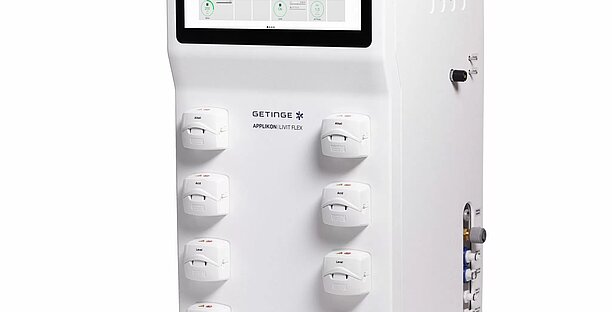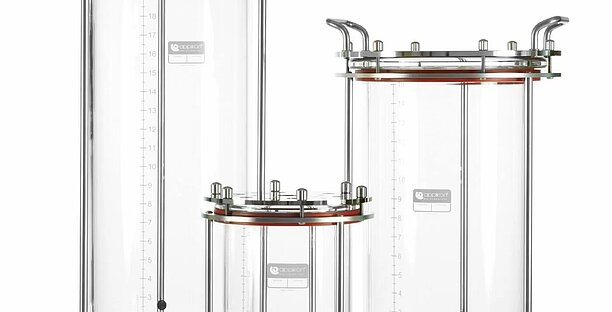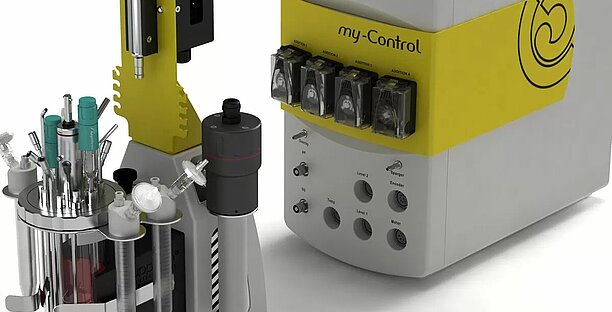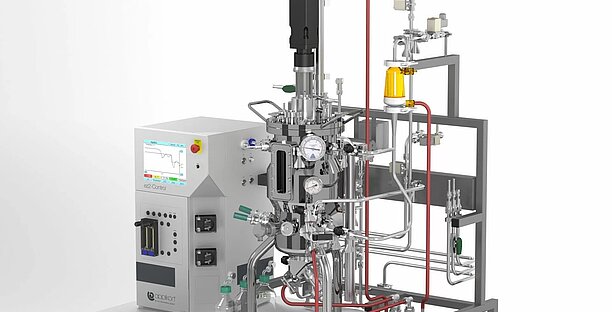Applications
Cultivating plant cells and algae in the Applikon glass bioreactor
Establishing a Controlled Environment
The Applikon glass lab scale bioreactor excels in providing a meticulously controlled environment essential for cultivating plant cells and algae. This advanced system ensures precise regulation of critical parameters such as temperature, pH, and gas exchange — key factors that drive photosynthesis and cellular metabolism. By optimizing these conditions, the bioreactor supports the efficient growth and productivity of both plant cells and algae, catering to the specific needs of various research and industrial applications.
By integrating these sophisticated features, the The Applikon autoclavable glass bioreactor not only optimizes the growth conditions for plant cells and algae bioreactor applications but also enhances the overall efficiency and yield of the cultivation process, making it an efficient tool for both research and commercial applications in biotechnology.
Inoculation and Culture Practices
Initiating cultures within the Applikon autoclavable glass bioreactor involves aseptic inoculation with either plant cell suspensions or algal strains. Plant cells, typically introduced as callus or undifferentiated cells, thrive under the bioreactor's controlled conditions, which are ideal for growth and differentiation. Algal cultures, introduced from pure strains, benefit from an environment that prevents contamination and promotes robust monocultural growth.
Optimized Nutrient Supply
A balanced delivery of nutrients is critical for the cultivation of plant cells and algae. The Applikon glass bioreactor features sophisticated feeding systems that administer a precise mixture of nutrients, including carbon sources (primarily CO2 for algae), nitrogen, vitamins, and minerals. This targeted nutrient supply is crucial for maintaining optimal growth rates and metabolic efficiency.
Efficient Gas Exchange and Aeration
Proper gas exchange is vital for supplying CO2 for photosynthesis while maintaining suitable oxygen levels to support aerobic respiration and prevent oxidative stress. The Applikon autoclavable glass bioreactor is designed to allow efficient gas exchange and aeration, with capabilities for fine-tuning these parameters to meet the dynamic needs of the cultures.
Advantages of the Applikon autoclavable bioreactor for plant cell and algae cultivation
The Applikon autoclavable glass bioreactor offers several advantages for the cultivation of plant cells and algae:
- Scalability: It provides a scalable solution from research-scale to commercial production, optimizing culture conditions before larger scale-up.
- Control and precision: Advanced monitoring and control systems ensure that all environmental parameters can be finely tuned and maintained, resulting in higher yields and better-quality products.
- Versatility: The bioreactor is suitable for a wide range of applications, from producing secondary metabolites and biopharmaceuticals using plant cell cultures to biofuel and high-value biochemical production with algae.
- Efficiency: Designed for ease of use and minimal maintenance, it maximizes productivity and reduces operational costs.
The Applikon autoclavable glass bioreactor stands as a cornerstone of innovation for the cultivation of plant cells and algae, enabling scientists and industries to exploit the full potential of these organisms. With its precision control and versatile capabilities, it represents a pivotal tool in the biotechnological advancement toward sustainable and economically viable production of bio-based products.
Feautured Products
Livit Flex bioprocess control system
The Livit Flex bioprocess controller is an intuitive and easily configurable bioprocess controller that fits any biotech upstream R&D application. Livit Flex can be configured as a single or dual control system for single-use or multi-use bioreactors to optimize bench space in the laboratory.

Livit Flex is ideal for use with single-use and reusable bioreactors up to 20L as well as our single-use pilot reactors.
Glass autoclavable bioreactors
The Applikon autoclavable bioreactor is a very popular bioreactor. It is available in 2, 3, 5, 7, 15 and 20-litre volumes. It is easy to adapt if your research changes. Thanks to the modularity and flexibility of the glass bioreactors, you can modify the system to fit any adaptations in process demands.

The glass bioreactors help support and optimise your research and process development. The systems are suitable for both cell culture and microbial culture applications.
my-Control
This colorful controller with the built-in web server is the ideal solution for small scale bioreactors starting at 50mL working volume. It uses minimal bench space and allows parallel bioprocessing for microbial as well as cell cultures.

The myControl is the perfect solution for screening, process optimization or media development.
Stainless steel bioreactors
Stainless steel bioreactors play a key role in the development and production biotech products. From bench to pilot to full production – the Applikon bioreactors simplify your scale-up through consistent design and scalable control solutions.

Our portfolio offers both standard systems for fermentation and cell cultures as well as customized systems.
Mini bioreactors MiniBio
The MiniBio is a true scale down of the traditional lab-scale bioreactor. The reactor is available in 250 mL, 500 mL and 1000 mL volumes and customizable to meet the demands of any bioprocess. It saves time, requires minimal bench space and generates more data with fully scalable results.

Despite its small footprint, the MiniBio can meet any process requirements. Whether for Batch, FedBatch or perfusion processes.
We are eager to receive your feedback
* Mandatory fields
